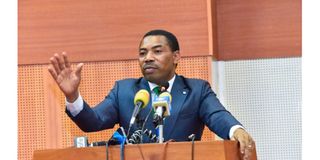Government goes back to drawing board over levies

Finance and Planning minister Nchemba speaks during a news conference in Dodoma yesterday PHOTO | MERCIFUL MUNUO
What you need to know:
- Economists yesterday commended the government's promise to review additional levies imposed on electronic cash transfers at the start of 2022/23 financial year following a chorus of protests against the move
Dar es Salaam. The government has gone back to the drawing board on mobile money transaction and bank service levies, and is also considering to stop using tenants from collecting ten percent withholding tax on rented houses.
Economists welcomed the decision yesterday, saying review of the levies will come as a much needed relief for Tanzanians.
The levies have drawn sharp criticism, with stakeholders saying they were making life even tougher for ordinary Tanzanians.
Economists who spoke to The Citizen said although the government had good intentions, the charges were unacceptable since they amounted to double taxation.
It is on those grounds that people have been crying foul over the same, with economists saying the government’s intervention could mean a lot.
Yesterday, four ministers sought to the charges in a joint news conference Dodoma.
They are Mr George Simbachawene (Prime Minister’s Office – Parliament, Policy and Coordination); Dr Mwigulu Nchemba (Finance and Planning); Prof Joyce Ndalichako (Prime Minister’s Office – Labour, Youth, Employment and Persons with Disability), and Mr Innocent Bashungwa (President’s Office – Regional Administration and Local Government).
Dr Nchemba said the government had started working on complaints over levies.
“The government has heard the outcry, and we are working on complaints about double deductions on mobile money transactions when sending or receiving cash,” he said, and hinted that a decision could be reached soon.
On the issue of bank charges, he said the government will sit with service providers to negotiate again.
On house tax, he noted that it was landlords, not tenants, who are supposed to foot the bill.
“In order to eliminate disputes between tenants and landlords, the government will consider the opinions of the people who proposed the removal of the tenants from this issue so that the government can claim its dues directly from landlords,” he stressed.
Dr Mwigulu stated that tax on houses for rent was well-meaning, but there were shortcomings with the collection strategy.
“We have received various opinions from various fronts, and we are now going to work on them,” said the minister.
For his part, Mr Bashungwa explained how levies were important in solving local government problems, including the construction of classrooms and health facilities.
He said until December 2020, the government had built 102 district hospitals, 487 health centres and 1,195 clinics.
Mr Bashungwa said that within one year, charges on mobile transactions had made it possible to build 234 health facilities, including laboratories.
But adjourning Parliament in Dodoma earlier in the year, Prime Minister Kassim Majaliwa said Sh599.7 billion had been issued for implementation of development projects in Tanzania Mainland, while Sh231 billion being part of Covid-19 relief funds had been disbursed to Zanzibar.
According to the Premier, the amount of funds and respective sectors in brackets as of December 2021 is Sh180.4 billion (health), Sh353.4 billion (education), Sh32.7 billion (water), Sh26.8 billion (tourism) and the Tanzania Social Action Fund (Tasaf) that garnered Sh5.5 billion.
Speaking to The Citizen yesterday, an economist from Mzumbe University, Dr Daudi Ndaki, said, “What the government has done is a good step that shows that it aims to serve Tanzanians.
“We are optimistic that a team of experts will come up with positive answers that will help in shaping the country’s economy.”
An economist from the University of Dar es Salaam (UDSM), Dr Wilhelm Ngasamiaku, commended the government’s move.
He expressed his optimism that a team of experts appointed to review the charges would come up with measures that could not bring complaints.
“It is better to do more improvements and more research on this issue (levies) to establish its social and fiscal implications, this will help more,” he said.





